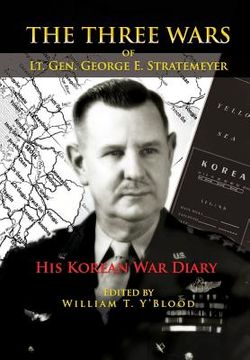The Three Wars of Lt. Gen. George E. Stratemeyer: His Korean War Diary (en Inglés)
Reseña del libro "The Three Wars of Lt. Gen. George E. Stratemeyer: His Korean War Diary (en Inglés)"
From June 25, 1950, to May 20, 1951, Lt. Gen. George E. Stratemeyer, the Far East Air Forces commander, kept a diary of his activities during the Korean War. A number of general officers kept such diaries during World War II, although the practice was generally frowned upon by higher headquarters and, in the Navy at least, was against regulations. In the Korean War, the writing of such works became less wide-spread. Surprisingly, however, three diaries written by senior Air Force officers (Stratemeyer, Maj. Gen. Earle E. Partridge, Commander, Fifth Air Force, and Maj. Gen. Edward J. Timberlake, Vice Commander, Fifth Air Force) exist from the Korean War. These three diaries view the war from different perspectives: Stratemeyer's from a high-level planning, strategy, and political viewpoint; Partridge's from a mid-level planning and operational plane; Timberlake's from a slightly lower operational level. This book, however, deals only with General Stratemeyer's diary. It is a valuable document because his position as Far East Air Forces commander allowed him to observe the war and its personalities from a unique perspective. General Stratemeyer had his secretary type his diary entries onto 6 by 9 1/2-inch loose-leaf lined pages. Totalling some 750 pages, these were then placed into three large binders covering the periods June 25 - September 15, 1950, September 16 - December 16, 1950, and December 17, 1950 - May 20, 1951. The editor has changed this time division somewhat to conform to certain significant events and to make each section more or less equal in length. September 14 now ends the first section; the second section begins the following day with the Inch'on landings and concludes on November 25 with the opening of the massive Chinese Communist offensive; the final section covers the period November 26, 1950, to May 20, 1951, the date of Stratemeyer's heart attack. The reader should be aware that, although it was the intent of the editor to keep this diary as published as close as possible to the original, it is not the "raw" diary as Stratemeyer had it transcribed. By remaining close to the original, all messages have been retained even though some were word-for-word repeats of messages entered earlier, perhaps just a paragraph before. However, to prevent an overload of "sics," brackets or other such emendations, certain editorial changes have been made. This has been done primarily to make the text more readable. As General Stratemeyer wrote the diary and his secretary typed it, punctuation tended to wander or be non-existent at times. Commas and other such punctuation were often omitted, resulting in words which ran together or created occasional odd sentences. Also, Stratemeyer (or his secretary) often used quotation marks randomly for no particular reason. He (or they) also tended to capitalize everything that had an "official" ring to it, regardless of whether it was necessary or not (e.g., "Ground Force," "Border," etc.). In the case of place names, at times he capitalized the entire name but in the next sentence capitalized only the first letter of the name. Therefore, proper punctuation and capitalization has been inserted throughout the text. United State Air Force, Air Force History and Museums Program.

